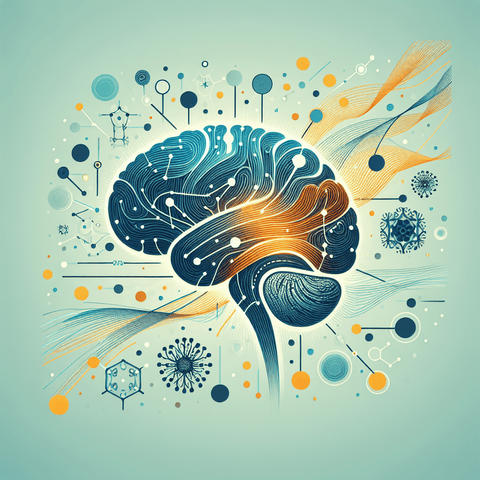Introduction
In recent years, there has been a surge of interest in nutritional strategies to support brain health and enhance cognitive function. Our mental performance, memory, and overall neurological vitality are vital components of daily life, impacting everything from work productivity to emotional well-being. As science advances, it becomes clear that certain nutrients play a fundamental role in maintaining and boosting cognitive health. Among these, Vitamin B12 has garnered significant attention for its critical influence on brain function. This blog explores the fascinating ways Vitamin B12 can serve as a powerful ally in supporting your mental prowess, and how you can optimize your intake for maximum benefits.
Vitamin B12: A Crucial Nutritional Supplement for Brain Function
Vitamin B12, also known as cobalamin, is a water-soluble vitamin essential for numerous physiological processes. It is a vital nutrient that the body cannot produce on its own, requiring dietary intake from animal products or supplements to meet daily needs. B12 is particularly crucial for the synthesis of red blood cells, DNA production, and, importantly, the health of our nervous system.
At a biochemical level, B12 acts as a cofactor for enzymes involved in methylation processes and neurological function. It is indispensable for maintaining the myelin sheath — the protective covering around nerve fibers that ensures proper electrical conduction. Without sufficient B12, the integrity of nerve cells and neural pathways can deteriorate, leading to cognitive impairments and neurological issues.
Research indicates that optimal B12 levels are associated with better cognitive outcomes, including improved memory and mental clarity. Conversely, deficiencies have been linked to cognitive decline, mood disorders, and neurological disturbances. Globally, B12 deficiency is a common concern, especially in populations with limited dietary animal intake, such as vegans and vegetarians, as well as in older adults who often have reduced absorption capabilities due to aging-related gastrointestinal changes. People with certain medical conditions, such as pernicious anemia or malabsorption syndromes, are particularly vulnerable.
Given the prevalence and potential impact of B12 deficiency on brain health, supplementing with B12 can be a practical strategy. Available in various forms, such as oral tablets, sublingual drops, or injectable preparations, B12 supplementation is especially recommended for vulnerable groups to maintain optimal brain and nervous system function.
Enhancing Brain Boost Through Adequate B12 Intake
Many individuals seek ways to boost mental energy, alertness, and agility. Adequate Vitamin B12 levels play a significant role in facilitating these aspects of cognition. B12 is integral to the production of neurotransmitters — the chemical messengers that enable communication between brain cells — including serotonin, dopamine, and norepinephrine. These neurotransmitters influence mood, focus, and mental stamina.
When B12 levels are sufficient, the synthesis of these neurochemicals is optimized, leading to heightened mental alertness and rapid information processing. Conversely, deficiency can result in cognitive sluggishness, mental fatigue, and reduced concentration. Supporting brain health with B12 supplementation can, therefore, serve as a natural way to enhance mental agility.
Numerous scientific studies have shown that individuals supplementing with B12 experience improvements in cognitive test scores, especially in areas related to memory and executive function. For example, research involving older adults suggests that restoring B12 levels through supplementation can help slow cognitive decline and improve mental performance.
Practical implementation involves incorporating B12-rich foods such as meat, fish, eggs, and dairy into your diet. For those with increased needs or absorption issues, supplementing with high-quality B12 products may offer a reliable boost. For example, taking a B12 supplement in the morning before work can help sharpen your focus and sustain mental energy throughout a demanding day. Combining B12 with other cognitive-enhancing nutrients like omega-3 fatty acids or magnesium may further support mental vitality; you can explore [DHA/EPA Omega-3 Supplements](https://www.topvitamine.com/collections/dha-epa-omega-3-supplements) for enhancing brain function synergistically.
Supporting Cognitive Function with Vitamin B12
The ways in which B12 supports cognitive functions extend beyond energy and alertness. Memory, learning, and information processing are highly dependent on the structural and functional integrity of neural networks, which B12 helps maintain. Adequate B12 levels contribute to the preservation of gray matter volume, which is critical for processing information and forming memories.
Neurological research indicates that B12 deficiency can cause neural damage, leading to issues with memory recall, slower information processing speeds, and difficulties with learning new skills. These symptoms often appear early in deficiency states, signaling the importance of early intervention. Identifying subtle signs such as forgetfulness, difficulty concentrating, or mental fog can prompt timely B12 assessment and supplementation.
Furthermore, B12 works synergistically with other nootropics and cognitive supplements to reinforce neural health. Combining B12 with nutrients like folate and vitamin K can enhance neuroprotective effects. Some nootropic formulations incorporate B12 as a key component to support cognitive resilience and enhance mental clarity, especially during mentally demanding tasks or periods of stress.
Maintaining adequate B12 intake is essential not only for immediate cognitive function but also for preventing long-term decline. This is particularly relevant in aging populations, where cognitive deterioration may be mitigated through proper nutritional support. As a part of a comprehensive approach, B12 supplementation can help sustain your cognitive health today and preserve it for the future.
Neurological Support: Protecting and Repairing Nerve Cells
The health of your nervous system hinges on the integrity of nerve cells and their myelin sheaths. B12 plays a fundamental role here, facilitating nerve repair and ensuring proper signal transmission. Myelin, the fatty substance that insulates nerve fibers, is vital for rapid and accurate nerve conduction.
A deficiency in B12 can compromise myelin synthesis, leading to neurological symptoms such as numbness, tingling, and weakness — hallmark signs of peripheral neuropathy. In more severe cases, B12 deficiency has been associated with cognitive disturbances and even neurodegenerative diseases like Alzheimer’s. Ensuring sufficient B12 intake supports the regeneration of nerve cells and helps maintain healthy neural pathways.
Research shows that B12 deficiency is linked with increased risk of neurological conditions and that supplementation can reverse or slow some of these processes if caught early. B12 supports nerve health by aiding in the remyelination process, which is essential in nerve repair and the maintenance of overall neurological integrity. This is especially critical for those with longstanding deficiency or at increased risk, such as older adults or individuals with autoimmune conditions affecting B12 absorption.
Long-term maintenance of adequate B12 levels offers neuroprotective benefits, reducing the likelihood of nerve degeneration and preserving cognitive function. Incorporating B12 through diet or supplements can significantly impact neurological resilience and recovery from injury or degenerative changes.
Promoting Mental Clarity and Focus with Vitamin B12
In today’s fast-paced environment, mental clarity and focus are more valuable than ever. B12 contributes significantly to these qualities by supporting the biochemical pathways that underpin concentration and cognitive endurance. When your B12 levels are optimal, you often notice increased mental sharpness, clarity during busy workdays, and quicker decision-making.
During stressful or exhausting periods, mental fog is a common complaint. B12 helps combat this by correcting underlying deficiencies that impair neurotransmitter function and energy metabolism. Many anecdotal reports and clinical observations highlight a clear improvement in mental sharpness following B12 supplementation. Some individuals experience reduced fatigue and a more sustained level of mental alertness throughout the day.
To maximize mental clarity, timing your B12 intake may be beneficial. For example, taking B12 in the morning or before mentally demanding tasks can provide an ongoing cognitive boost. When combined with lifestyle choices such as adequate sleep, physical activity, and other nootropics, B12 transforms into a potent tool for mental enhancement.
Exploring high-quality B12 products like sublingual tablets or injectable forms can provide rapid absorption and quick mental benefits. Remember, maintaining balanced nutrition overall is essential for sustained mental agility, so consider a holistic approach that includes other brain-supportive nutrients. For instance, you might combine B12 with magnesium, which supports relaxation and focus, accessed through [Magnesium Benefits](https://www.topvitamine.com/collections/magnesium-benefits-energy-muscle-bone-support).
Addressing B12 Deficiency for Optimal Brain Health
B12 deficiency is a common yet often overlooked contributor to cognitive and neurological issues. Several factors increase the risk of deficiency, including aging, vegetarian or vegan diets, gastrointestinal disorders, Pernicious anemia, and certain medications such as proton pump inhibitors and metformin.
Recognizing deficiency symptoms early can prevent long-term neurological damage. Common signs include fatigue, weakness, pale skin, numbness or tingling sensations, difficulty walking, memory problems, and mood disturbances. These symptoms warrant medical evaluation, including blood tests for serum B12 levels, methylmalonic acid, and homocysteine, which offer a comprehensive picture of B12 status.
When deficiency is diagnosed, treatment options vary depending on severity. Oral B12 supplements are effective for many, but severe deficiency or absorption issues may require intramuscular injections or sublingual preparations. Ensuring a diet rich in B12-rich foods — such as meat, fish, dairy products, and fortified cereals — is essential for prevention. If diet alone is insufficient, supplementation is the most practical approach to maintain adequate levels and support your cognitive health.
Long-term maintenance of appropriate B12 levels can significantly improve neurological function, reduce the risk of neurodegenerative diseases, and promote overall mental well-being. Be proactive about your health by consulting healthcare providers for personalized advice and considering high-quality B12 supplements from trusted sources like Topvitamine.
Conclusion
Vitamin B12 is undeniably a cornerstone in preserving and enhancing brain health. Its vital role in nerve function, neurotransmitter synthesis, and neural integrity underscores its importance for cognitive performance across all ages. Whether you seek to boost mental energy, support memory, or protect against neurological decline, ensuring adequate B12 levels is a smart and scientifically supported strategy. Incorporating dietary sources, regular testing, and high-quality supplements can help you unlock the full potential of this essential nutrient.
As part of a holistic approach to mental wellness, consider consulting with healthcare professionals to determine your individual needs. Exploring nutritional supplements like B12, along with other brain-supporting nutrients, can pave the way toward sharper cognition, better mental clarity, and overall neurological vitality.
Q&A Section
Q1: Why is Vitamin B12 important for brain health?
Vitamin B12 is essential for maintaining healthy nerve cells, supporting myelin sheath formation, and facilitating neurotransmitter synthesis—all critical for optimal brain function and cognitive health.
Older adults, vegans, vegetarians, individuals with absorption issues, and those with certain medical conditions (e.g., pernicious anemia) are at higher risk of deficiency, which can impact cognitive and neurological health.
You can increase your B12 intake through diet (meat, fish, eggs, dairy), fortified foods, or supplements such as sublingual tablets or injections, especially if you belong to a vulnerable group.
Research suggests that adequate B12 levels support neurotransmitter production and neural health, which may improve memory, mental clarity, and focus, particularly in individuals with deficiency.
Folate, vitamin K, omega-3 fatty acids, and magnesium are nutrients that complement B12 in supporting neural function and cognitive performance.
Important Keywords
- Vitamin B12
- Brain health
- Cognitive enhancement
- Memory support
- Neuroprotection
- Neurological health
- B12 deficiency
- Neurotransmitters
- Mental clarity
- Supplements
- Vegan B12 sources
- Neural pathways
- Myelin sheath
- Neurodegenerative support



